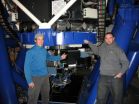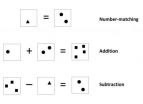STYRIA, AUSTRIA, August 30, 2012 (Press-News.org) "Fuel instead of food", is currently a common question - although this need not be. The first generation of biofuels is mostly made of corn, wheat or sugarcane. But that's not exactly the ideal solution. Biofuels of the 2nd generation are made of agricultural waste - from wood chips, straw or specially cultivated "energy crops". The Austrian competence centre acib (Austrian Centre of Industrial Biotechnology) has found ways to make these renewable sugar resources available for industry and for the production of biofuels.
The enzymes that are used are called cellulases. They can cleave cellulose and hemicellulose - both components of wood (besides lignin) - into small sugar molecules, explains Professor Christian Kubicek of the Technical University of Vienna. In the framework of the center of excellence acib, he works together with researchers in Graz and at an industrial partner's site on the access of new industrial sugars from renewable resources. The enzymes work like choppers, says Professor Anton Glieder, scientific director of acib, "the long cellulose chains are transported through the enzymes. Thereby, the enzyme cuts small sugar molecules off the comparatively huge cellulose chain, until the whole cellulose is digested into smaller sugars." The best enzymes for the process are produced using the fungus Trichoderma reesei, which normally grows on decaying wood residues. In the Styrian project "MacroFun" at Graz University of Technology the fungal enzymes are be improved by using the yeast Pichia pastoris to make the "molecular shredder" more robust, declares Glieder.
Admittedly, the general procedure is still extensive, says Kubicek. The plant remains or "energy crops" such as flower stalk grass (Miscanthus) or switchgrass (Panicum virgatum) must first be "unlocked" to separate the lignin and make the cellulose accessible. Then specially designed cellulases come into play and cleave the long cellulose chains into small sugars. These are finally converted - similar to the alcoholic fermentation in wine - from yeast to bioethanol, which can then be used for biofuels. The great advantage of this method: food remains completely unaffected and the carbon footprint looks a lot better.
How promising this type of sugar and subsequently biofuel production is, shows the fact that in Europe alone 400 million tons of wheat straw per year accumulate. To ensure a sustainable use, 30% of them remain on the field to regenerate the soil, but the enormous residue can be processed further. Actually, about 1 liter of bioethanol could be made from 5 kg of straw. The goal for acib is to raise the yield by optimization of the degrading enzymes and to make more yet unused sugar sources available for biofuel production. 2nd generation biofuels could be ready to use within 3 to 5 years, says Glieder.
About acib:
The Austrian Centre of Industrial Biotechnology (acib) is Europe's leading competence centre for industrial biotechnology. It is an alliance of seven Austrian universities and 27 industrial project partners such as BASF, DSM, Sandoz, Boehringer Ingelheim RCV, Jungbunzlauer, F. Hoffmann-LaRoche, Novartis, VTU Technology and Sigma Aldrich. acib is owned by the Universities of Innsbruck and Graz, Graz University of Technology, the University of Natural Resources and Life Sciences Vienna and Joanneum Research.
170 co-workers are actively doing research in more than 30 research projects. The budget amounts to about 60 million Euros until December 31, 2014. Public funding (58% of the budget is provided by the Austrian Research Funding Agency (FFG), the Standortagentur Ti-rol, the Styrian Business Promotion Agency (SFG) and the Technology Agency of the City of Vienna (ZIT).
The competence centre acib - Austrian Centre of Industrial Biotechnology - is funded in the framework of the Austrian COMET programme (Competence Centers for Excellent Technolo-gies) by the Federal Ministry of Economy, Family and Youth (BMWFJ), the Federal Ministry of Traffic, Innovation and Technology (bmvit) and the provinces af Styria, Vienna and Tyrol. The COMET programme is managed by the Austrian Research Promotion Agency FFG.
Website: http://www.acib.at
Austrian Centre of Industrial Biotechnology (acib) Develops Advanced Biofuels Without Food Use
Today wheat or corn is mostly used to produce biofuels. But this use of food is not necessary. acib and an industrial partner developed methods, which use agricultural waste and straw as basis for new biofuel materials.
2012-08-30
ELSE PRESS RELEASES FROM THIS DATE:
Wave Energy Company Eco Wave Power is Getting Closer to Commercial Scale Power Plant
2012-08-30
Having designed, manufactured and tested a mid-scale model of wave energy generating unit, Eco Wave Power has successfully proven the concept of producing cheaper electricity from the ocean waves energy. Based on a number of their patented inventions, like "Power Wing" and the "Wave Clapper", their electricity generation unit can transform ocean wave energy into electric current more effectively than competitors' units.
Amongst many advantages of system its durability truly stands out - it employs three different storm protection mechanisms, corrosion ...
Joe's Crab Shack Showcases the World's Best Seafood with New Steampots
2012-08-30
Summer travel season may be winding down, but the new menu items at Joe's Crab Shack offer a taste of the exotic, transporting guests to locales as far-flung as the North and South Poles and the island nation of New Zealand.
Always committed to providing its customers with the highest-quality seafood available, the national seafood restaurant will highlight two new Steampots - Joe's signature menu items - that introduce diners to fresh-caught Antarctic king crab, Alaskan queen crab and green lip mussels from New Zealand. The new Steampots, on the menu today, take advantage ...
Bruegger's Bagels Joins Effort to End Childhood Hunger in America
2012-08-30
One in five children in America can't count on getting enough to eat each day, according to the U.S. Department of Agriculture. To do their part, Bruegger's Bagels will kick off a fundraising campaign on September 4 to support Share Our Strength's No Kid Hungry campaign, joining thousands of restaurants nationwide in the fight to end childhood hunger in America.
Bruegger's will raise money through its Facebook page and in the company's 300-plus bakeries across the U.S. On Facebook, people can simply "Like" Bruegger's and the bagel leader will donate $1 to ...
Las Cumbres Observatory spectrographs acquire target robotically
2012-08-29
Two identical FLOYDS spectrographs, installed in recent weeks at telescopes 6,000 miles apart, robotically acquired a supernovae target this week. Due to the level of precision required and the difficulty involved, few if any, other ground-based spectrographs have ever achieved this milestone.
"This is unprecedented," staff astronomer David Sand explained. "In a matter of just a few weeks, Las Cumbres Observatory was able to install the spectrographs, achieve first light, and begin robotic operations. It's unheard of." Sand is already gathering data from the spectrographs ...
Stanford researchers discover the 'anternet'
2012-08-29
On the surface, ants and the Internet don't seem to have much in common. But two Stanford researchers have discovered that a species of harvester ants determine how many foragers to send out of the nest in much the same way that Internet protocols discover how much bandwidth is available for the transfer of data. The researchers are calling it the "anternet."
Deborah Gordon, a biology professor at Stanford, has been studying ants for more than 20 years. When she figured out how the harvester ant colonies she had been observing in Arizona decided when to send out more ...
Kepler discovers planetary system orbiting two suns
2012-08-29
The system, known as Kepler-47, harbours the smallest known transiting circumbinary planets -- planets orbiting a pair of stars -- to date. The planets were discovered using NASA's Kepler space telescope [1] by monitoring thefaint drop in brightness produced when both planets transit (eclipse) their host stars [2].
"In contrast to a single planet orbiting a single star, planets whirling around a binary system transit a moving target," explains Jerome Orosz (San Diego State University, USA), lead author of the study. "The time intervals between the transits and their duration ...
Sweet building blocks of life found around young star
2012-08-29
Life is made up of a series of complex organic molecules, including sugars. A team of astronomers led by researchers from the Niels Bohr Institute, have now observed a simple sugar molecule in the gas surrounding a young star and this discovery proves that the building blocks of life were already present during planet formation. The results have been published in the scientific journal Astrophysical Journal Letters.
The star was observed with the new large international telescope, Atacama Large Millimeter Array (ALMA) in northern Chile. The ALMA telescopes are able to ...
Sweet result from ALMA
2012-08-29
A team of astronomers using the Atacama Large Millimeter/submillimeter Array (ALMA) has spotted sugar molecules in the gas surrounding a young Sun-like star. This is the first time sugar been found in space around such a star, and the discovery shows that the building blocks of life are in the right place, at the right time, to be included in planets forming around the star.
The astronomers found molecules of glycolaldehyde -- a simple form of sugar [1] -- in the gas surrounding a young binary star, with similar mass to the Sun, called IRAS 16293-2422. Glycolaldehyde ...
Adelaide joins with Italy to develop 'super spaghetti'
2012-08-29
University of Adelaide researchers are working with colleagues in Italy to produce better quality pasta that also adds greater value to human health.
Two research projects - being conducted by the ARC Centre of Excellence in Plant Cell Walls at the University's Waite Campus - will start next month in collaboration with researchers from the Italian universities of Bari and Molise.
The aim of the ARC Centre of Excellence is to look at the fundamental role of cell walls (biomass) in plants and discover how they can be better utilized. Both of these new projects will investigate ...
Math ability requires crosstalk in the brain
2012-08-29
A new study by researchers at UT Dallas' Center for Vital Longevity, Duke University, and the University of Michigan has found that the strength of communication between the left and right hemispheres of the brain predicts performance on basic arithmetic problems. The findings shed light on the neural basis of human math abilities and suggest a possible route to aiding those who suffer from dyscalculia-- an inability to understand and manipulate numbers.
It has been known for some time that the parietal cortex, the top/middle region of the brain, plays a central role ...
LAST 30 PRESS RELEASES:
Wildfire smoke linked to rise in violent assaults, new 11-year study finds
New technology could use sunlight to break down ‘forever chemicals’
Green hydrogen without forever chemicals and iridium
Billion-DKK grant for research in green transformation of the built environment
For solar power to truly provide affordable energy access, we need to deploy it better
Middle-aged men are most vulnerable to faster aging due to ‘forever chemicals’
Starving cancer: Nutrient deprivation effects on synovial sarcoma
Speaking from the heart: Study identifies key concerns of parenting with an early-onset cardiovascular condition
From the Late Bronze Age to today - Old Irish Goat carries 3,000 years of Irish history
Emerging class of antibiotics to tackle global tuberculosis crisis
Researchers create distortion-resistant energy materials to improve lithium-ion batteries
Scientists create the most detailed molecular map to date of the developing Down syndrome brain
Nutrient uptake gets to the root of roots
Aspirin not a quick fix for preventing bowel cancer
HPV vaccination provides “sustained protection” against cervical cancer
Many post-authorization studies fail to comply with public disclosure rules
GLP-1 drugs combined with healthy lifestyle habits linked with reduced cardiovascular risk among diabetes patients
Solved: New analysis of Apollo Moon samples finally settles debate about lunar magnetic field
University of Birmingham to host national computing center
Play nicely: Children who are not friends connect better through play when given a goal
Surviving the extreme temperatures of the climate crisis calls for a revolution in home and building design
The wild can be ‘death trap’ for rescued animals
New research: Nighttime road traffic noise stresses the heart and blood vessels
Meningococcal B vaccination does not reduce gonorrhoea, trial results show
AAO-HNSF awarded grant to advance age-friendly care in otolaryngology through national initiative
Eight years running: Newsweek names Mayo Clinic ‘World’s Best Hospital’
Coffee waste turned into clean air solution: researchers develop sustainable catalyst to remove toxic hydrogen sulfide
Scientists uncover how engineered biochar and microbes work together to boost plant-based cleanup of cadmium-polluted soils
Engineered biochar could unlock more effective and scalable solutions for soil and water pollution
Differing immune responses in infants may explain increased severity of RSV over SARS-CoV-2
[Press-News.org] Austrian Centre of Industrial Biotechnology (acib) Develops Advanced Biofuels Without Food UseToday wheat or corn is mostly used to produce biofuels. But this use of food is not necessary. acib and an industrial partner developed methods, which use agricultural waste and straw as basis for new biofuel materials.









